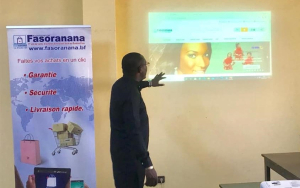Eric Bemba Expands E-Commerce and Delivery Services in DR Congo
- Eric Bemba founded Wiikko, a Kinshasa-based shopping and delivery platform launched in 2019.
- The platform connects local merchants and restaurants with digitally connected consumers.
- Bemba also serves as Yango’s country director in DR Congo and co-founded fintech startup Splitti.
Eric Bemba is a Congolese entrepreneur active in technology and mobility. He founded Wiikko, a shopping and delivery platform that allows users to order products from restaurants and stores and receive them at an address of their choice in Kinshasa.
The company launched Wiikko in 2019 as a mobile application available on major online app stores. The platform targets a broad audience familiar with social media and evolving digital consumption trends. Users select their items, and the Wiikko team manages the process from preparation to delivery.
By simplifying ordering, tracking and delivery, Wiikko acts as an intermediary between merchants, restaurateurs and customers. The platform also enables consumers to discover new stores, products and promotional offers. For businesses, the platform provides additional visibility, order management tools and a logistics service that extends operations to customers’ homes.
Alongside this venture, Eric Bemba serves as country director of Yango in the Democratic Republic of Congo and as operations director for Francophone Africa. He also co-founded Splitti in 2020, a fintech company that enables users to create groups and collect funds to finance events.
Bemba graduated from the University of Alabama in 2009 with a bachelor’s degree in commerce and business administration. He began his career in 2010 at ConseilRH, a French recruitment consulting firm, where he served as international payroll manager.
He joined EY Paris in 2013 as a consultant in audit, advisory, tax and legal services. He returned to Kinshasa in 2016 and joined Compagnie Financière du Congo as a consultant. He then became head of development at SESOMO Services, a human resources services provider, in 2017.
This article was initially published in French by Melchior Koba
Adapted in English by Ange J.A de Berry Quenum
Nigerian Startup Timon Targets Borderless Payments for Global Travelers
- Nigerian startup Timon offers an all-in-one financial app for travelers, students, and remote workers living across borders.
- The platform provides multi-currency wallets, global payment cards, eSIM services, and money transfers in over 100 countries.
- The mobile app has surpassed 50,000 downloads on Android since its 2023 launch.
Timon operates as a digital solution developed by a Nigerian startup. The company designed the product for frequent travelers, international students, remote workers, and users who adopt a borderless lifestyle. Founders Oluwatomi Olarinde and Chizaram Ucheaga launched the startup in 2023.
At the core of Timon’s offering, a mobile application combines multiple financial services. The app allows users to create and manage multi-currency wallets, including naira and U.S. dollars. The platform also provides physical and virtual payment cards that users can access in more than 100 countries. In addition, the app integrates complementary services such as international eSIMs and money transfers. Timon offers the application on iOS and Android, where downloads have exceeded 50,000, according to Google Play Store data.
“We comply with local and international financial regulations, use advanced fraud prevention systems, and apply industry-standard encryption to protect your funds and personal information at all times,” the startup said.
Through the mobile platform, users can pay online or in stores, plan trips, activate cards instantly, and convert stablecoins into spendable currencies. Timon targets a seamless user experience through transparent fees, rapid service deployment, and an interface designed for globally mobile African users and diaspora communities.
By combining financial management, global connectivity, and universal payment cards, the Nigerian fintech positions itself as a digital financial passport for 21st-century travelers, digital nomads, and mobile professionals.
This article was initially published in French by Adoni Conrad Quenum
Adapted in English by Ange J.A de Berry Quenum
André de Wet Connects Local Merchants and Consumers Through Flood App
-
South African entrepreneur André de Wet founded Flood to digitize local commerce through mobile-first platforms.
-
Flood aims to become a “Shopify for physical stores” by turning existing audiences into local marketplaces.
-
The platform targets telecoms, digital banks, and SMEs seeking monetization and proximity-based engagement.
André de Wet is a South Africa–based entrepreneur operating from Cape Town. He founded Flood, a platform designed to help neighborhood retailers remain visible and competitive in a mobile-driven economy without imposing complex technologies.
Founded in 2020, Flood positions itself as a commerce solution built for a smartphone-centric world. The company aims to create the equivalent of Shopify for physical stores that serve customers in person while extending relationships into digital channels.
The platform converts existing audiences, including telecom subscribers, digital bank customers, and radio listeners, into localized marketplaces. The audience owner becomes the central access point where consumers discover offers, select products, and complete payments.
Flood primarily targets organizations that control large user bases, including telecom operators and digital banks, but underutilize their commercial potential. The platform allows these organizations to become their customers’ main digital destination by combining offer discovery and payment within a single environment.
For small and medium-sized businesses, Flood simplifies engagement with geographically nearby customers and places merchants at the center of a local digital ecosystem. For consumers, the platform enables mobile wallet usage, contactless payments, instant rewards at purchase, and real-time interaction tracking.
Alongside Flood, André de Wet founded consulting firm 2ndBase in 2018 and serves as its chief executive officer. The firm supports corporate clients in understanding and adopting digital technologies. He launched his first entrepreneurial venture in 2005 with the creation of IT services company WebTec.
From an academic perspective, de Wet holds a bachelor’s degree in medicine earned in 1989 from the University of the Free State in South Africa. He later earned a master’s degree in international management from the University of Salford in 2020. He began his professional career in 1997 at Global Visual Media, where he served as senior marketing manager.
In 2010, de Wet joined fintech company PayU as head of business development. In 2011, he became chief executive officer of price-comparison platform PriceCheck. Between 2016 and 2017, he served as Africa head at on-demand entertainment platform iFix.
This article was initially published in French by Melchior Koba
Adapted in English by Ange Jason de BERRY QUENUM
La Poste Burkina Faso Digitizes Retail via Fasoranana Marketplace
- La Poste Burkina Faso launched Fasoranana in 2019 as part of its digital transformation strategy.
- The platform integrates e-commerce, payment, and nationwide delivery through the postal network.
- Fasoranana supports local merchants while expanding access to online retail in Burkina Faso.
La Poste Burkina Faso developed Fasoranana as an online commerce platform. The postal operator designed the solution to allow users to buy and sell goods easily. The platform, launched in 2019, forms part of the operator’s broader strategy to embed digital services into its core postal activities.
Fasoranana operates through a mobile application available on Android. The application has already recorded more than one hundred downloads, according to the Play Store.
On the platform, customers browse hundreds of products through smartphones or web browsers. Users select items, manage orders, and complete secure payments via mobile money, bank cards, or cash on delivery. Meanwhile, La Poste Burkina Faso ensures delivery through its national postal network, which leverages its logistics and distribution expertise.
Fasoranana aims to recreate the physical market experience in a digital environment. The platform reduces travel constraints and improves purchasing convenience for Burkinabe consumers. At the same time, the initiative allows local merchants to expand online operations, reach new customers, and increase visibility without facing traditional barriers linked to physical retail.
By broadening access to e-commerce, Fasoranana contributes to the modernization of Burkina Faso’s retail sector. In addition, the platform capitalizes on existing postal infrastructure to deliver an integrated solution covering sales, payments, and last-mile delivery.
This article was initially published in French by Adoni Conrad Quenum
Adapted in English by Ange Jason Quenum
Hazem Afify Uses Technology to Reshape FMCG Distribution in Africa
- Hazem Afify founded Sumet in 2021 to modernize FMCG supply chains for African retailers.
- Sumet targets local and informal markets that traditional distribution networks serve inefficiently.
- The platform enables rapid deliveries, sometimes within 24 hours in major urban areas.
Hazem Afify is an Egyptian-born entrepreneur based in Dar es Salaam, Tanzania. He founded and currently leads Sumet as chief executive officer. The technology company redesigns fast-moving consumer goods supply chains for neighborhood retail stores.
Sumet launched operations in 2021. The company positions itself as a dedicated platform for fast-moving consumer goods. The platform aims to facilitate market entry and brand growth across Africa. The company focuses on local and often informal markets, where traditional distribution networks struggle to serve small retailers efficiently.
The platform allows merchants to order a wide range of branded products with a few clicks. The system provides fast delivery, sometimes within 24 hours in selected urban areas. This model reduces travel time, lowers logistics costs, and limits stock-out risks.
For brands and distributors, Sumet provides detailed visibility into product performance at individual retail outlets. The platform enables order tracking and merchandise flow monitoring. These features allow manufacturers to optimize delivery planning, adjust field presence, and better understand retailers’ operational needs.
Alongside Sumet, Hazem Afify co-founded and leads Global Business as chief executive officer. The export, import, and distribution company operates from Turkey. The company launched in 2015. It focuses primarily on fast-moving consumer goods and cosmetics. The company maintains branches in Tanzania, including Dar es Salaam and Zanzibar.
Hazem Afify graduated from Cairo University in Egypt. He earned a bachelor’s degree in electronic and communications engineering in 2007. He began his professional career in 2008 at Mentor Graphics. The electronic design automation company employed him as a technical marketing engineer and later as an integrated circuit design consultant until 2015.
This article was initially published in French by Melchior Koba
Adapted in English by Ange Jason Quenum
Vuba Vuba Emerges as Rwanda’s Leading Local Delivery Platform
- Vuba Vuba launched in 2020 to fill the gap left by Jumia Food’s exit from Rwanda in 2019.
- The app connects users to restaurants, supermarkets, and local merchants with deliveries in under an hour.
- The platform has surpassed 100,000 downloads on Android and relies on motorcycle-based local logistics.
Vuba Vuba is a mobile application developed by a Rwandan startup. Albert Munyabugingo launched the platform in 2020. The application connects users to a wide range of restaurants, supermarkets, and merchants. The service offers fast deliveries, often in less than one hour.
The application operates on iOS and Android platforms. Google Play Store data show more than 100,000 downloads. The company relies on a strong local logistics network. The platform uses motorcycle couriers to distribute orders efficiently.
Beyond delivery services, Vuba Vuba creates economic opportunities for local stakeholders. The platform allows food outlets and small retailers to digitize sales channels. The solution helps merchants expand customer reach and increase order volumes without heavy investment in proprietary digital infrastructure.
The application integrates a tracking system that alerts customers when couriers collect orders. The system allows users to follow deliveries in real time and receive notifications when couriers approach. “Our team works diligently to ensure fast processing and delivery of orders. The estimated delivery time depends on your location. In general, you can expect your order to arrive within 45 minutes,” the startup said.
As e-commerce and digital services continue to expand across East Africa, Vuba Vuba demonstrates how locally adapted solutions can drive digital inclusion. The model supports entrepreneurship and responds to rising demand for efficient delivery services.
This article was initially published in French by Adoni Conrad Quenum
Adapted in English by Ange Jason Quenum
Younes Chaoui Eases Access to Local Services in Algeria
-
Bricoram, founded in 2023, connects Algerian consumers with professionals across more than 100 service categories.
-
The platform operates free-of-charge for clients and prioritizes rapid matching based on geography and declared skills.
-
Founder Younes Chaoui, an AI specialist, previously worked for Kostango, IDEX and Deloitte.
Younes Chaoui, an Algerian computer scientist specialized in artificial intelligence, founded Bricoram after he observed consumers’ persistent difficulty finding reliable service providers. He created the platform to align with daily usage habits and deliver a simple digital access point for household services.
Chaoui launched Bricoram in 2023 to connect households seeking services with qualified professionals. The platform lists more than 100 categories, initially focusing on everyday needs such as plumbing while progressively opening to additional trades.
Bricoram operates free for clients. It allows users to post requests, receive offers from professionals, and select the preferred proposal. After a client submits a request, Bricoram automatically notifies nearby providers. Professionals then send offers, which clients receive via email, SMS and app notification. Users can compare profiles, speak with providers by phone, WhatsApp or internal chat, and post a review after completion.
The platform positions itself as a visibility and business-development tool for professionals. Providers open an account and complete a detailed profile describing their activity, services, portfolio and a photo. Bricoram then channels incoming requests according to the professional’s declared services and geographic coverage.
Chaoui holds a master’s degree in artificial intelligence from the University of Science and Technology Houari Boumediène in Algeria (2015). He also earned a master’s degree in decision computer science from Blaise Pascal University in France in 2016.
He began his career in 2016 as technical director at Kostango, a French digital operations-management platform. In 2023, he joined IDEX as a Django consultant before moving to Deloitte, where he worked as an Angular consultant until 2024.
This article was initially published in French by Melchior Koba
Adapted in English by Ange Jason Quenum
Togo’s Cookeza Launches Ready-to-Cook Local Food Packs Online
- Cookeza, a Togolese foodtech startup founded in 2024, sells ready-to-cook meal kits made from 100% local ingredients.
- The platform partners directly with local farmers to ensure freshness and support the national agri-food value chain.
- The company plans to expand across West Africa and diversify distribution through subscriptions and supermarkets.
Cookeza, a Lomé-based startup, aims to redefine convenience cooking in Togo by offering online ready-to-cook food kits featuring locally sourced ingredients. The company targets busy urban consumers who want quick meals without losing touch with traditional African flavors.
Founded in 2024 by Duphanie Amadou, Cookeza operates an e-commerce platform that sells boxes containing washed, chopped, and seasoned ingredients for authentic African dishes. Customers receive recipe cards and can order delivery to their homes or pick-up points.
“Cookeza was born from a simple observation: modern African families lack time to cook but don’t want to sacrifice quality or forget their culinary roots,” the company states on its website. “We work directly with local producers to ensure freshness and quality while supporting the local economy.”
The platform integrates e-commerce and urban logistics to shorten cooking time. Through its website, users can browse meal kits—such as traditional Togolese recipes—and order online. Each pack includes all necessary ingredients sourced from nearby farmers, ensuring both freshness and traceability.
Cookeza’s model benefits not only consumers but also Togo’s agricultural value chain. By prioritizing local sourcing, the company strengthens ties between food producers and urban markets, offering farmers a steady outlet for their produce.
Although Cookeza has not yet launched a mobile app, customers can order directly via web browsers. The company also offers subscription packages for restaurants, corporate canteens, and households, including a monthly plan priced at CFA40,000 (about $70.70).
With around 20 available recipes, Cookeza plans to expand its offerings and distribution channels. Future goals include partnerships with supermarkets and regional expansion into West Africa.
The startup faces challenges typical of the sector: maintaining quality at scale, optimizing delivery logistics, and competing with fast-food chains and ready-made meal providers. However, its focus on authentic African cuisine and local supply chains could help it secure a strong niche in the growing African foodtech market.
This article was initially published in French by Adoni Conrad Quenum
Adapted in English by Ange Jason Quenum
Amir Redwan Bets on Group Buying to Support Ethiopian Farmers
-
ChipChip connects farmers directly with urban consumers through group-buying technology.
-
The company pays “group leaders” to organize collective orders and deliveries.
-
Amir Redwan previously founded Tikus Delivery, a bicycle-based food-delivery service in Addis Ababa.
Ethiopian software engineer and entrepreneur Amir Redwan is using technology to connect rural farmers to urban consumers. He co-founded ChipChip to allow buyers to pool orders and cut distribution costs.
Founded in 2023 by Redwan and European entrepreneur Mateo Klemmayer, ChipChip operates a group-purchasing platform that links customers with agricultural producers outside traditional supply chains. The company aims to provide competitive prices while supporting farmer incomes.
ChipChip groups customers into buying clusters to reduce acquisition costs. Farmers benefit from direct access to the market. The company pays “group leaders” to form and manage purchasing groups and oversee coordination and delivery.
Before ChipChip, Redwan co-founded Tikus Delivery in 2020 and serves as its CEO. The service offers mobile food ordering and home delivery in Addis Ababa using electric and non-electric bicycles.
Redwan graduated in 2018 with a bachelor’s degree in software engineering from Addis Ababa Science and Technology University. He completed an internship at Kifiya Financial Technology before becoming a software engineer in 2019. He worked for Modern Cyber Intel Consultancy and Med Innovation in Ethiopia’s technology sector.
This article was initially published in French by Melchior Koba
Adapted in English by Ange Jason Quenum
Mohammed El-Beltagy Turns AI Into Efficiency Lever for Businesses
Moroccan entrepreneur Mohammed El-Beltagy has built his career around applying artificial intelligence to business performance. He founded and leads Optomatica, a deep-tech consulting firm specializing in AI, machine learning and advanced optimization.
Optomatica focuses on accelerating the transition from ideas to final products by developing tailored AI systems that improve decision-making and data management. The company positions itself as “AI-First” and adapts its technologies to operational contexts across industries.
Founded in 2003, Optomatica operates in fintech, sports technologies, digital health, conversational intelligence, logistics, and process optimization. The firm aims to create practical AI applications and unlock new technical opportunities for clients and their markets.
Alongside Optomatica, El-Beltagy has pursued multiple ventures. In 2014, he co-founded Racefox, a digital coach for running and cross-country skiing. Four years later, he launched ConsultingPad, a platform linking consultants with enterprises, and joined AIM Technologies, an AI-focused firm, as a board member.
In 2021, he helped establish Optofolio, a wealth management platform; Jilatee, a circular fashion company; and DFin Holding, a fintech venture.
Since 2022, El-Beltagy has served as co-founder and chief technology officer of Flend, a financing platform that uses data and technology to support small and medium-sized enterprises. That same year, he founded Racemate, a sports technology company, where he chairs the board and serves as CTO.
El-Beltagy graduated in biomedical engineering from the American University in Cairo in 1994. He earned a master’s degree in mechatronics from Lancaster University in 1996 and a PhD in mechanical engineering from the University of Southampton in 2000.
His professional record includes senior positions in technology firms. From 2007 to 2017, he worked at Hive Streaming, a live video distribution company, as chief scientist and later as innovation director. Between 2013 and 2017, he served as innovation director at Novelari, an innovation accelerator. More recently, from 2020 to 2021, he was CTO at Elves, an Egypt-based travel app.
This article was initially published in French by Melchior Koba
Adapted in English by Ange Jason Quenum











